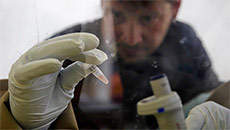Treating infertility in women may soon have a new approach as researchers have now identified the biological clock that governs female fertility.
The granulosa cells of the primary follicle that nourish and support eggs in the uterus may serve as the biological clock that monitors the onset of menopause, a study showed.
The onset of menopause is influenced by the point at which the uterus runs out of eggs to release.
A signalling pathway in the granulosa cells plays a key role in enabling immature eggs to survive, the researchers noted.
"This mechanism permits the granulosa cells to decide when eggs will begin to grow and when they will die," said Kui Liu from University of Gothenburg in Sweden.
"In that sense, they serve as a kind of biological clock that monitors the onset of menopause," Liu explained.
The study could shed light on why some women can have successful pregnancies at the age of 50, whereas other are unable to get pregnant when they are 30.
The discovery will point the way to interventions that stimulate the growth of eggs that have been unable to mature, the researchers stressed.





